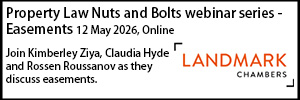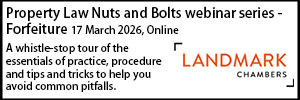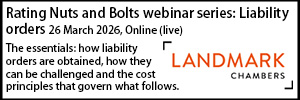London borough refused permission to appeal in £1.6m Community Infrastructure Levy dispute
- Details
Lord Justice Lewison has refused Newham Council permission to appeal the High Court's dismissal of its judicial review application of HM Revenue & Custom’s (HMRC) decision that a floating hotel is not a building for Community Infrastructure Levy (CIL) purposes.
The London borough was seeking a CIL payment of £1.6 million, based on its contention that the Good Hotel London was liable to CIL as it met the definition of a "building" for the purposes of CIL.
However, HMRC's appointed person (AP) had concluded that the 160-room hotel was not a building, and so was not required to pay the council a CIL levy.
The council disputed this, arguing that the AP had failed to heed that the meaning of 'building' in CIL Regulations was not the same as its meaning under the Town and Country Planning Act 1999, and that the AP failed to heed the purpose of the legislation to ensure that costs incurred in supporting the development of an area can be funded by owners and developers of land.
It also claimed that they had misinterpreted caselaw, wrongly concluded that a vessel could not be a building and failed to consider alternative dictionary interpretations of 'building'.
The council's application for judicial review was dismissed in July 2024 by Mrs Justice Lang, who concluded that the vessel was not a building even though it is moored long-term in the Royal Docks.
Lang J said that the literal meaning of 'building', which is 'a thing which is built', would not have enabled HMRC to determine the meaning of 'building' in the context of the CIL Regulations "because it is too broad".
Richard Honey KC of Francis Taylor Building, appeared for the respondents, leading Ben Du Feu of Cornerstone Barristers, instructed by HMRC solicitors.
Honey said: "In his decision of 1 November 2024 refusing permission to appeal the dismissal, Lewison LJ noted that what the relevant planning permission permitted was the mooring of a floating hotel and that the underlying question was whether the floating hotel was or was not a building.
"Lewison LJ said that whether something is or is not a building is a question of fact and degree.
"The AP's decision was carefully reasoned and disclosed no error of law, so an appeal would have no real prospect of success."
Adam Carey
Sponsored articles
Walker Morris supports Tower Hamlets Council in first known Remediation Contribution Order application issued by local authority
Unlocking legal talent
Senior Solicitor - Property
Legal Director - Government and Public Sector
Legal Officer
Locums
Poll














































